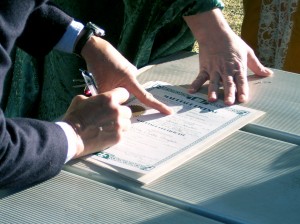 On September 2, 2014, the New Jersey Appellate Division published an opinion in the case of Krupinski v. Krupinski, reversing the trial court’s decision denying Mr. Krupinski’s motion to terminate alimony, and directing the trial court on remand to provide for an exchange of discovery and the possibility of an evidentiary hearing. The basis for Mr. Krupinski’s application was that his former spouse, from whom he was divorced in 1990, was receiving a large portion of this teacher’s pension through a Qualified Domestic Relations Order (QDRO). Continue reading ›
On September 2, 2014, the New Jersey Appellate Division published an opinion in the case of Krupinski v. Krupinski, reversing the trial court’s decision denying Mr. Krupinski’s motion to terminate alimony, and directing the trial court on remand to provide for an exchange of discovery and the possibility of an evidentiary hearing. The basis for Mr. Krupinski’s application was that his former spouse, from whom he was divorced in 1990, was receiving a large portion of this teacher’s pension through a Qualified Domestic Relations Order (QDRO). Continue reading ›
Articles Posted in Discovery
Power of Attorneys are not Allowed to Appear and Testify on Behalf of Divorce Litigant
In a recently published trial court decision, Marsico-v-Marsico, the Honorable Lawrence R. Jones, J.S.C., dealt with the novel question of law as to whether or not a designated power of attorney could appear and testify on behalf of or in lieu of a divorce litigant. After addressing this issue, Judge Jones ultimately decided that a power of attorney could not in fact appear and testify on behalf of a divorce litigant. Judge Jones was able to delineate and distinguish the factual circumstances of prior case law wherein similar situations were allowed to proceed. Continue reading ›
Social Media in the Law: What You Say (or Post) Can Be Used Against You
With the proliferation of ways to communicate via social media, such as Facebook, Twitter, Instagram, Youtube and blogging sites, it has become more common in legal settings for such postings to be used as evidence in court. Mainstream media outlets have been reporting recently about an unpublished May, 2014 Appellate Division decision in the matter of State v. H.L.M., which addressed the extent to which a court’s limit on the subject matter of a litigant’s online blogging was an infringement on her Constitutional Right to free speech. Continue reading ›
Entry of Default Judgment Requires Fairness in New Jersey
 Recently trial Judge L.R. Jones, J.S.C., an effective and prolific writer, explored the procedures to be followed when pursuing a default judgment. If a defendant does not file an answer or appearance within the thirty-five days after a divorce complaint is filed and lawfully served upon him or her, the plaintiff may file a request to enter default. Continue reading ›
Recently trial Judge L.R. Jones, J.S.C., an effective and prolific writer, explored the procedures to be followed when pursuing a default judgment. If a defendant does not file an answer or appearance within the thirty-five days after a divorce complaint is filed and lawfully served upon him or her, the plaintiff may file a request to enter default. Continue reading ›
The ESP Process in New Jersey Divorce Cases – a Call for Uniformity
The vast majority of divorce cases settle by way of an agreement reached between the parties. Only a small fraction of divorce cases are actually tried and decided by the court. Continue reading ›
Getting Started on the Business Valuation Process in a New Jersey Divorce
 In a previous blog post, “How the Fair Value of a Business Interest is Determined in a New Jersey Divorce for Purposes of Equitable Distribution”, James Yudes, Esq. explained the valuation methods utilized by the courts in determining the value of a business for purpose of equitable distribution in a divorce. Continue reading ›
In a previous blog post, “How the Fair Value of a Business Interest is Determined in a New Jersey Divorce for Purposes of Equitable Distribution”, James Yudes, Esq. explained the valuation methods utilized by the courts in determining the value of a business for purpose of equitable distribution in a divorce. Continue reading ›
Alternative Dispute Resolution: A Changing Landscape
 It is not always commonplace for case law in the State of New Jersey to come down in quick succession that will totally change the landscape of an area of law. However, that is just what has happened with regards to Alternative Dispute Resolution (ADR) thanks to the recent decisions handed down by the Supreme Court of New Jersey and the Appellate Division in the past two (2) months. Continue reading ›
It is not always commonplace for case law in the State of New Jersey to come down in quick succession that will totally change the landscape of an area of law. However, that is just what has happened with regards to Alternative Dispute Resolution (ADR) thanks to the recent decisions handed down by the Supreme Court of New Jersey and the Appellate Division in the past two (2) months. Continue reading ›
TIME IS MONEY: FIVE WAYS A CLIENT CAN REDUCE THEIR LEGAL FEES IN A DIVORCE
When meeting with a prospective divorce client during the initial consultation, after discussing the reasons for the breakdown of the marriage and obtaining the background information as to any financial and custodial issues, invariably the client will ask: Continue reading ›
The Matrimonial Litigation Process in New Jersey – In a Nutshell
The decision to seek a divorce is often difficult and painful. There is uncertainty about your future and possibly your children’s futures, and you may likewise be uncertain about what the Family Court process actually entails with regard to getting a divorce. Described below is a very brief outline of the matrimonial litigation process:
 New Jersey Divorce and Family Lawyer Blog
New Jersey Divorce and Family Lawyer Blog

